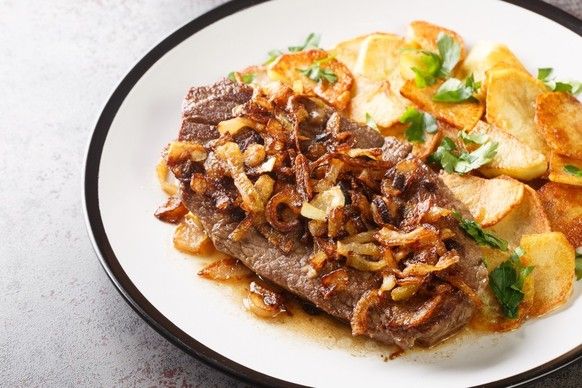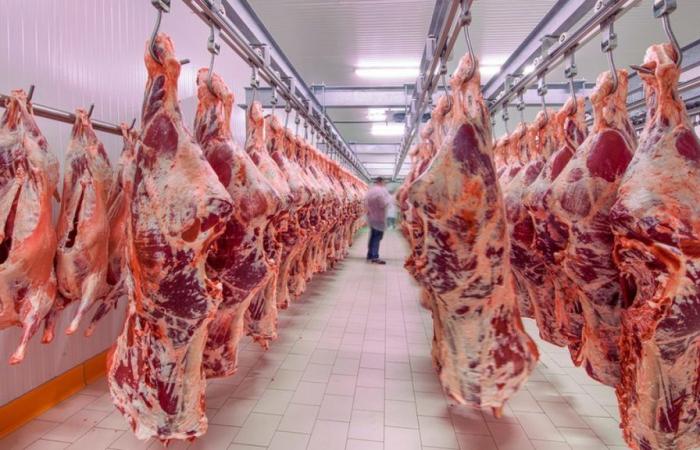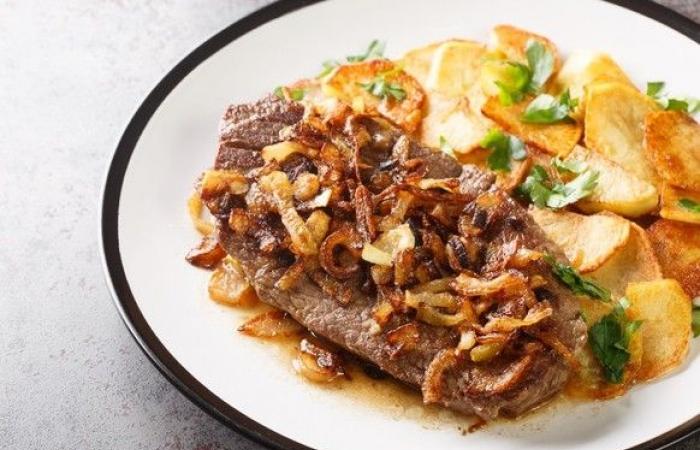Each Swiss consumes, on average, 50 kilos of meat per year.Image: Shutterstock
Too much meat consumption is harmful to your health and the planet. This is the case in Switzerland, where this practice is deeply rooted in mentalities. Faced with the climate emergency, things must change, warns a specialist. And the proposed measures will not please everyone.
The observation leaves less and less room for doubt. Most scientists agree that we need to reduce meat consumption, at least in the West. On the one hand, because of the polluting emissions it generates. According to UN calculations, the production of one kilo of beef generates 35 times more CO2 than a kilo of vegetables. On the other hand, because of the harmful effects that this food, processed meat in particular, can have on health.
The idea is gaining ground, but is struggling to take hold. Including in Switzerland, a country where meat consumption is “very high in international comparison”, indicates a study recently published by the Bern University of Agricultural, Forestry and Food Sciences (BFH-HAFL).
According to data relating to the year 2022, the Swiss consumed on average 50.8 kilos of meat per person. This is an amount three times higher than recommended by the EAT-Lancet commission, made up of international experts in nutrition, health and sustainable development. Or 301 grams per week, maximum.
The center of our plates
How do we explain this high consumption? This is a behavior that is deeply rooted in mentalities, and which has its origins in the past, indicates Mathilde Delley, scientific collaborator at BFH-HAFL and main author of the study. “Originally, meat was not widely available, and therefore rarely consumed, mainly for special occasions,” she illustrates.
Things changed from the 19the century, with the development of agriculture and the increase in the standard of living. “Meat began to be presented as an excellent food, having only positive aspects,” continues the researcher. “Its consumption was strongly encouraged for a large part of the following century, which eventually became part of the customs.”
“Eating a lot of meat has become a social norm, something that is considered normal, and therefore good”
Mathilde Delley, BFH-HAFL
“This food has acquired a very symbolic status, linked to wealth, access to a certain standard of living and generosity, and which is still in force among part of the population,” he adds. She.
The way it is prepared can also play a role. “Unlike other culinary traditions, where meat is cut into small pieces and mixed with vegetables, in Switzerland, we tend to put a whole piece on the plate,” explains the researcher. Which doesn’t make it easy to reduce portions. To this we can add the fact that our “relative wealth” makes this food “financially more accessible compared to other countries”.
Big differences at the sociocultural level
Its “difficult to imitate taste”, as well as “the ease with which it is prepared”, has made meat “the center of our plate”, summarizes Mathilde Delley. Which gave rise to “false representations”:
“If we ask people to put together an ideal plate, they will tend to indicate too large a portion of meat, without really realizing it”
Mathilde Delley, BFH-HAFL
And this, even though “current nutritional recommendations, based primarily on health, recommend significantly smaller quantities”.

“In Switzerland, we tend to put a whole piece on the plate. A steak or a chop has a given size, which cannot really be reduced,” says Mathilde Delley.Image: Shutterstock
This attachment to meat is not uniform within the Swiss population. The BFH-HAFL study highlights “important differences at the socio-cultural level”.
“City dwellers are more progressive on this issue, as are people of Swiss nationality and those with a high level of education”
Mathilde Delley, BFH-HAFL
Another determining element: gender. “In general, women eat less meat, want to eat less, and are more convinced by extrinsic and less selfish arguments, such as animal welfare or the environment,” illustrates Mathilde Delley.
“We want to dictate our ways of eating”
Despite this, it is clear that every time there is talk of reducing meat consumption, indignant reactions abound. On social networks and in the comments section of articles, we particularly deplore the fact that we want to “police” or “dictate our way of eating”.
The reason for such an outcry is very simple: “People don’t like being told how to behave,” says Mathilde Delley.
“When we touch on food, we touch on identity, on individual freedom. And people don’t like that at all.”
Mathilde Delley, BFH-HAFL
“They may feel like they are being deprived of something, that they have to sacrifice, that they are the victims of these policies», she adds. And this, even if there is no question of everyone becoming vegetarian or vegan, contrary to what some comments suggest.
“Certain constituents of red meat are good for health, even essential, and they are difficult to find elsewhere. It’s a fact,” says Mathilde Delley. “But there is no need to consume it massively.”
“What is bad, both for health and for the environment, is not meat as such, but its overconsumption. And, today, we consume far too much of it”
Mathilde Delley, BFH-HAFL
“Radical” measures
So reduce, not stop. A clear message, but not enough, according to the researcher. “Adopting a firm and honest message, which some will wrongly label as alarmist, is the only way to change things, to move from excessive consumption to adequate consumption,” she says. And to add:
“If we say that we just have to reduce, people will have the impression that it is not so serious, that the problem is almost already solved”
Mathilde Delley, BFH-HAFL
It is for this reason that the authors of the research believe that “voluntary giving up” is not effective, at least for “achieving rapid change”. So what to do? The study lists certain “fairly radical” measures, believes Mathilde Delley. Who warns: “They will not necessarily please everyone.”
The main goal: “To change the social norm, what is considered appropriate, festive and culinary interesting,” says the researcher.
First of all, by acting at the level of places of consumption subsidized by the State, which should offer “adapted menus”. Mathilde Delley develops:
“A basic menu without meat, dishes with meat available only on request and days without meat or fish”
Mathilde Delley, BFH-HAFL
Family education at school, which is part of the curriculum for most Swiss schoolchildren, would be another gateway. “We could learn to build new plates, to cook without meat, to use substitutes, legumes,” lists the researcher. “The interest in acting at the level of education is to be able to reach all social classes and backgrounds, as well as the consumers of tomorrow.”
Retail could also contribute, according to the author of the study: “Think about which products to highlight in stores. Decide to stop advertising campaigns on meat, while giving more visibility to alternatives.”
This type of measures would be “relatively easy to implement”, estimates Mathilde Delley, who recognizes that “convincing the branches would be a big challenge”. However, according to her, time is running out.
“In Switzerland, we prefer incentives to bans. We like consensus. The problem is that this approach is not very effective, particularly in the face of the climate emergency.
Mathilde Delley, BFH-HAFL








